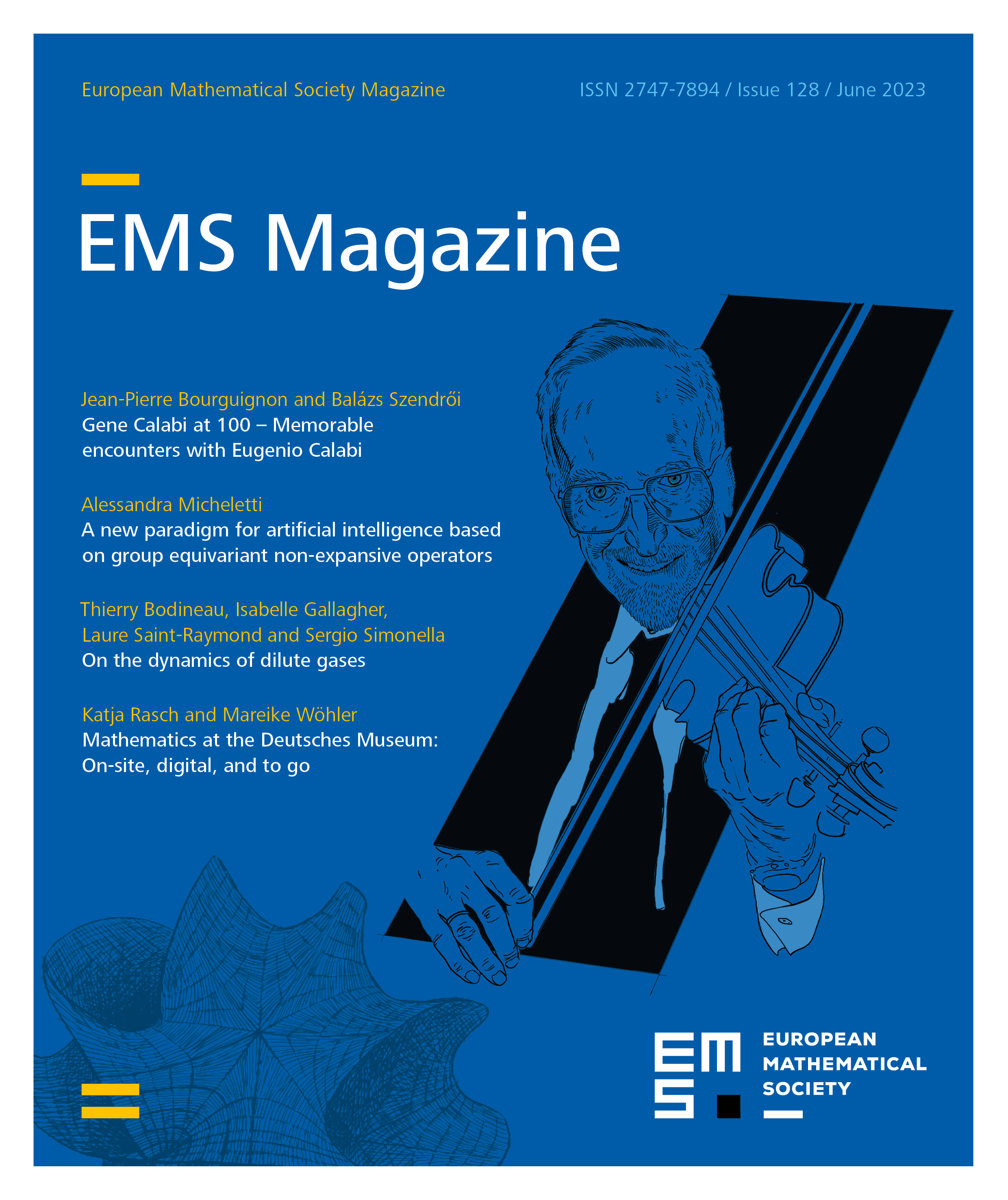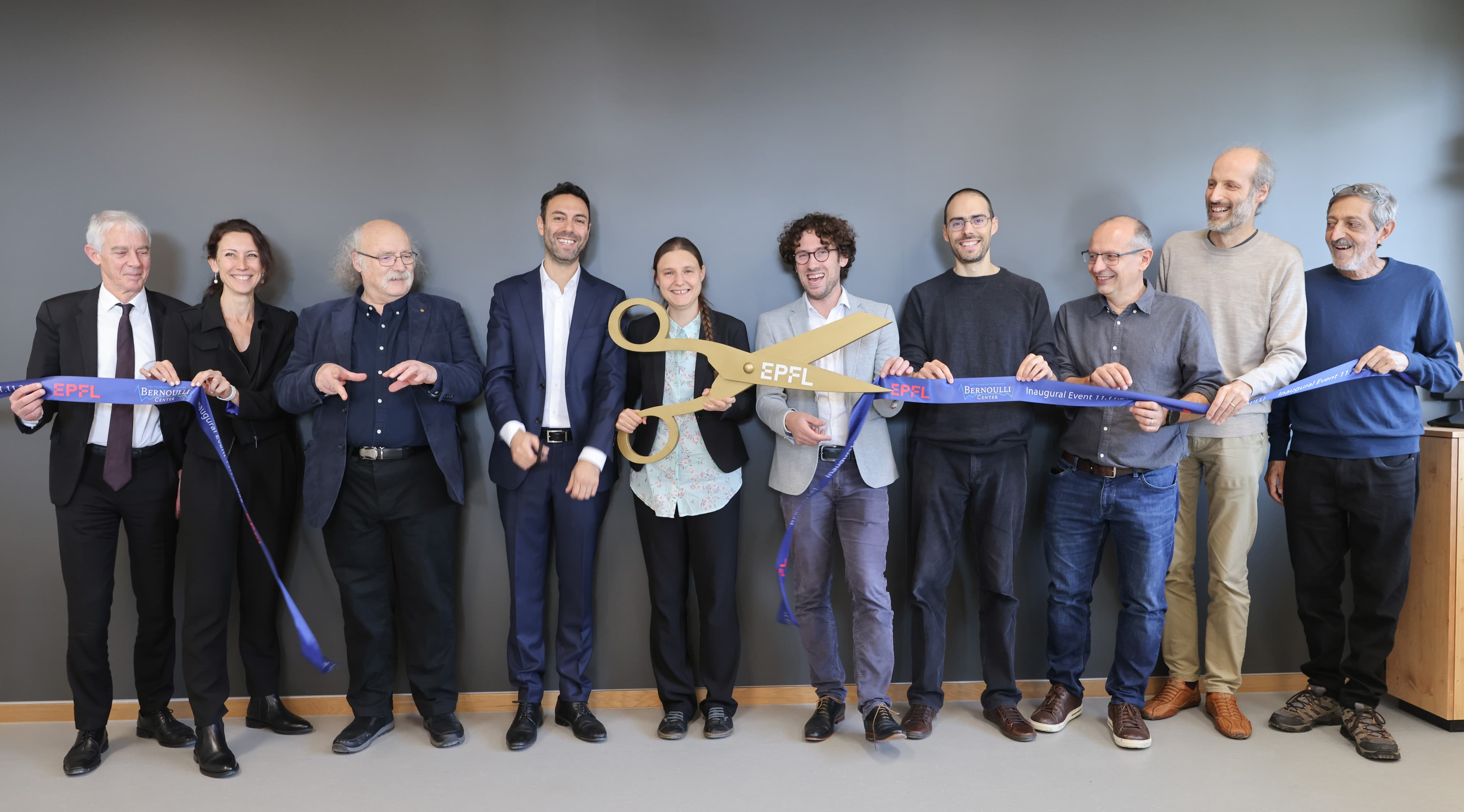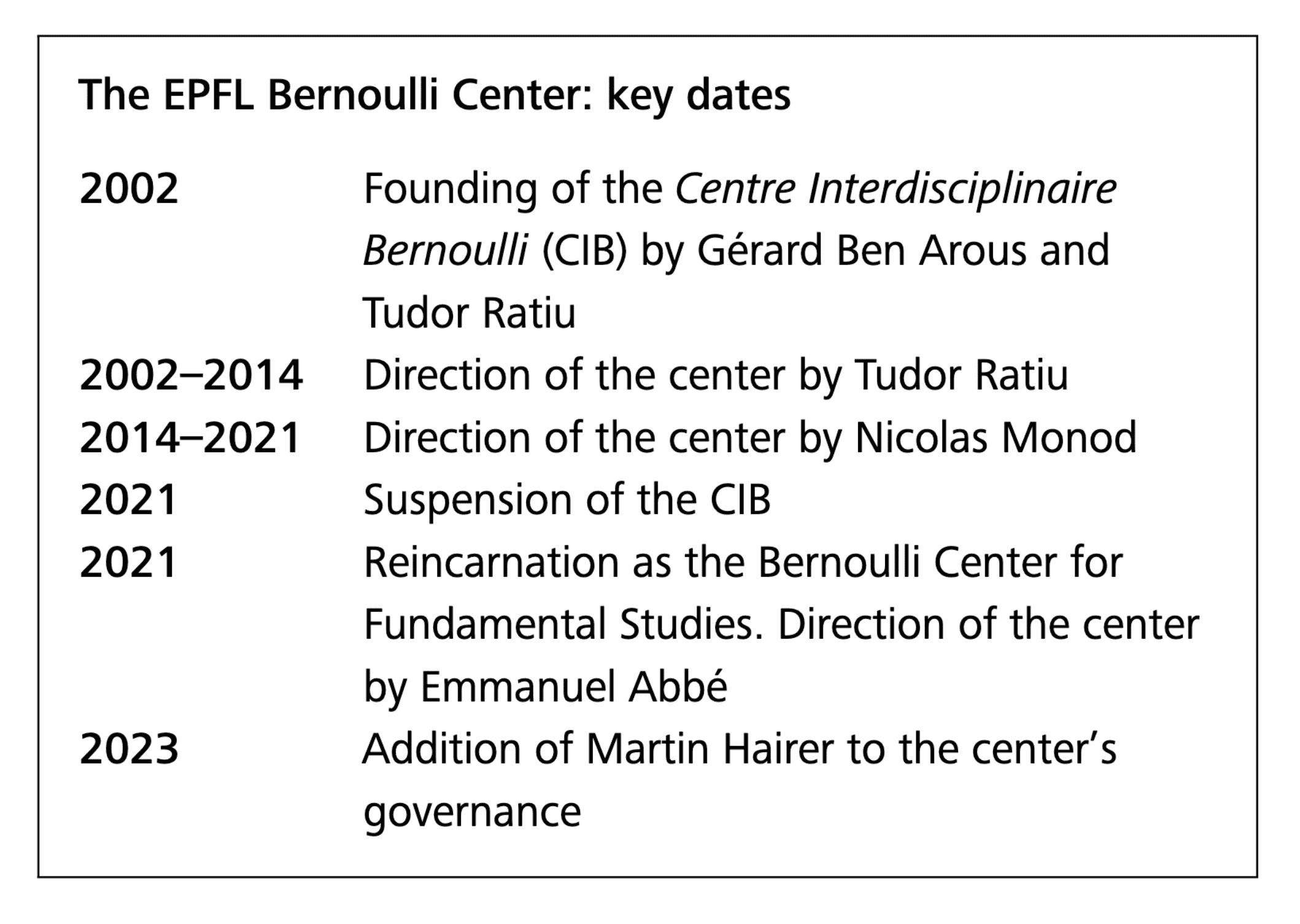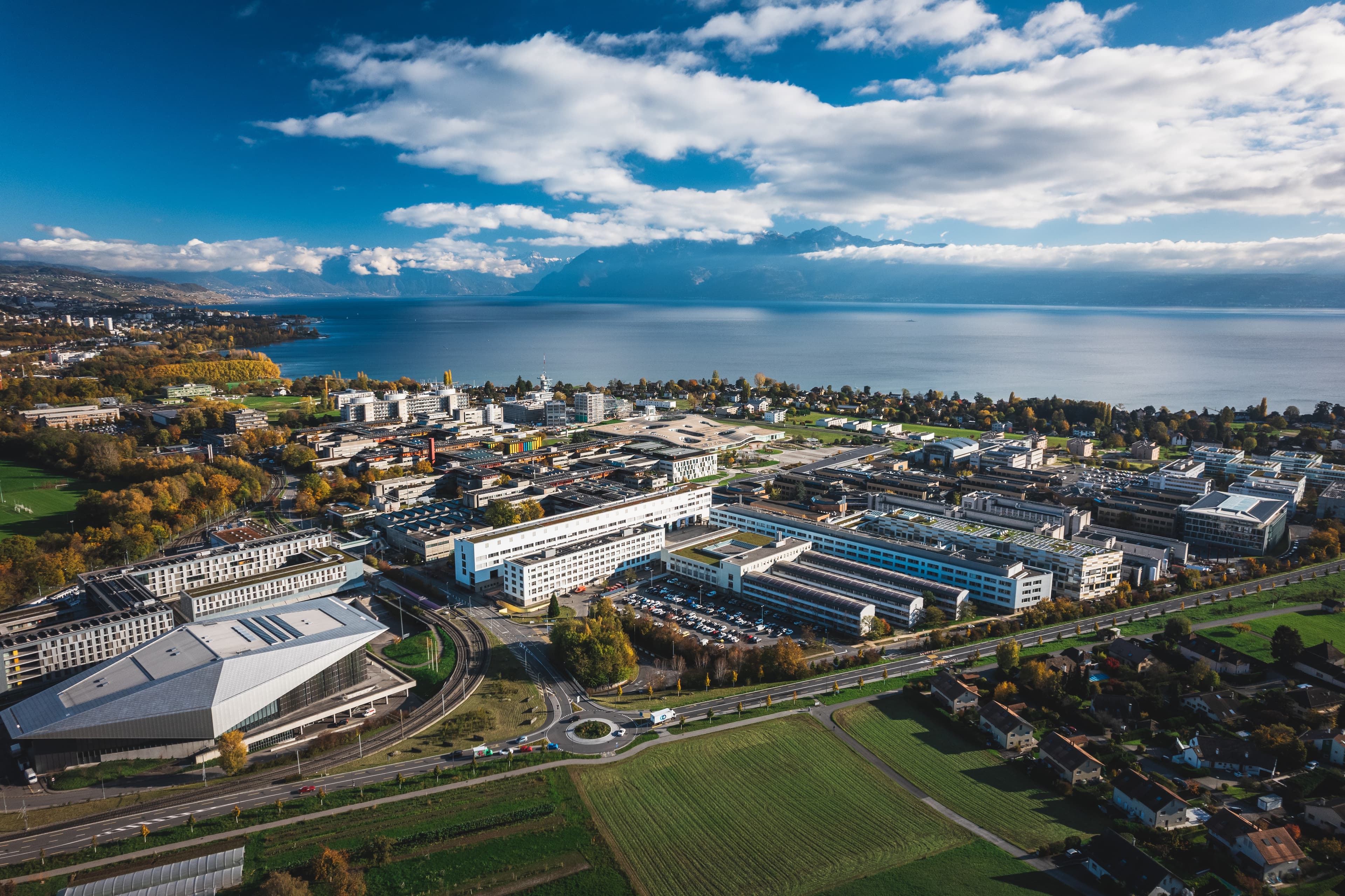Located on the picturesque shores of Lake Geneva, the freshly inaugurated Bernoulli Center for Fundamental Studies at the École Polytechnique Fédérale de Lausanne (EPFL) hopes to become a beacon for the advancement of fundamental research in mathematics, theoretical physics, and theoretical computer science.
November 11, 2022 was a big day at EPFL’s new Bernoulli Center for Fundamental Studies. The ceremonial cutting of the ribbon that took place under blue skies and the bucolic harmony of an alphorn choir symbolically ended a brief but intense period of renewal. It was a fresh start for a center with two intense decades of scientific advancement to look back on, in new facilities, building on a solid foundation and many lessons learned.
All rights reserved.
Undergraduates, PhD students, post-docs, faculty members, and researchers from EPFL and surrounding universities filled the lecture hall at the EPFL Rolex Learning Center. On the agenda: a series of keynote lectures from a star-studded, international speaker panel, including Maryna Viazovska, EPFL’s very own Fields Medalist, Abel Prize laureate Avi Wigderson from Princeton’s Institute of Advanced Study, Nobel Prize laureate Duncan Haldane from Princeton University, and Fields medalist Hugo Duminil-Copin from the neighboring University of Geneva.
It was a day dedicated to celebrating science, understanding, and excellence. From the opening remarks in the morning to the panel discussion in the late afternoon, there was palpable excitement about the new center’s role in bringing together researchers with different backgrounds to meet, learn from each other, and dream up new collaborations. Pushing at the boundaries of knowledge and betting on the “unreasonable effectiveness of theoretical studies” to inspire, fascinate, and, with a bit of luck, spawn a whole new field of scientific discovery.
A proven model of scientific advancement
This model of scientific advancement – creating a venue for the great and aspiring scientific minds of the day to congregate – has a fertile history to look back on, epitomized by the Bernoulli family, an eminent dynasty of Swiss scientists. Bathed in an academic milieu, constantly in touch with leading thinkers of their time, the Bernoullis made major contributions to mathematics, physics, mechanics, and other areas of basic science. Jacob derived the law of large numbers in probability theory, Johann developed the calculus of variations, and Daniel discovered the Bernoulli principle in fluid mechanics, to name just a few.
Founded as the Centre Interdisciplinaire Bernoulli (CIB) by Professors Tudor Ratiu and Gérard Ben Arous, the center was born of the desire to bolster the reputation of the engineering-focused school in the theoretical sciences. “The key event that paved the way for the CIB was the fusion of the basic science departments of EPFL and the University of Lausanne. To raise the level of theoretical sciences at EPFL, I had the idea to form a research center focusing on mathematics, physics, and chemistry,” recalls Ben Arous. He then set out to develop a center inspired by the Institut des Hautes Études Scientifiques (IHÉS) in Paris.
When the Centre Interdisciplinaire Bernoulli opened, it did so with a reduced scope compared to its ambitious aspirations, serving primarily as a visitors center for mathematicians. Nonetheless, it filled an important gap for theoretical mathematicians, explains Nicolas Monod, who directed the center from 2014 to 2021. “Theoreticians don’t have labs or experimental facilities such as the CERN’s Large Hadron Collider. That’s why having what I like to call a Large Brain Collider is so essential. If you are a student, you probably won’t spontaneously call up a famous researcher for a chat. But if you can collide with that researcher in front of a blackboard with a strong cup of tea, they might ask you what you are currently thinking about, and the magic can happen.”
Under Monod, the Bernoulli Center’s attractive force grew to the point that, for the first time, EPFL became closely associated with Fields medalists. “Every living Fields medalist visited EPFL. Abel Prize winners came to give lectures. Wolf Prize recipients and Nobel laureates participated in the center’s activities. There was a constant stream of decorated scientists coming to campus, learning to appreciate the surroundings, and, perhaps, hopefully, envisioning a career here,” says Monod.
All rights reserved.
Hosting over 500 visitors per year every year before the pandemic and with hundreds of applications coming in from researchers interested in participating in semester projects and shorter workshops, the Centre Interdisciplinaire Bernoulli firmly solidified its position on the map in fundamental mathematics. Despite that, with the many competing needs for space on campus and the disruptions caused by the COVID pandemic, the Bernoulli Center was briefly suspended in 2021 due to a lack of dedicated facilities.
Reaching for new heights
The Bernoulli Center’s second incarnation, this time as the Bernoulli Center for Fundamental Studies, was the fruit of a grassroots effort by an interdisciplinary group of theoretical researchers at EPFL that had formed around Emmanuel Abbé. Holding the Chair of Mathematical Data Science, straddling the divide between theoretical mathematics and computer science, Abbé was cut out for the job ahead. His career had been shaped by time spent in similar centers, including the Simons Institute for the Theory of Computing at the University of California, Berkeley, and the IAS at Princeton. “Our goal was to be inclusive and ambitious, and in about six months, we had put together a project backed by around 50 researchers on campus.”
At least in spirit, the new center is a continuation of its predecessor, despite its expanded scope covering theoretical physics and computer science in addition to mathematics. “At the new center’s core is an expanded program, building on three pillars. The first, the scientific program, involves semester-long research projects in which experts from around the world are invited to work with the local scientific community, picking up where the former center left off,” explains Abbé.
“The second pillar strengthens interactions across campus and neighboring institutions by offering a forum for theoretical researchers from different backgrounds to meet, run seminars and collaboration groups, and host other activities.”
“Finally, the third pillar reaches out to young talents – high school students and undergraduates hungry for challenges beyond the scope of their standard curriculum. This program includes a local mathematics competition for bachelor students, a new computer science class for high school students, public lectures, and more.”
The fresh start was also an opportunity to revise the center’s governance. “To be inclusive and sustainable in the long run, we set up an executive committee representing all three areas of research and overlapping directors with four-year term limits. An internal scientific advisory committee will be charged with curating the center’s short-term scientific programs. Meanwhile, an external scientific committee comprising eminent scientists from around the world will support the selection of long-term research programs, underwriting the high quality of the proposed research programs,” says Abbé.
The new Bernoulli Center takes shape
The new center kicked off its activities well in advance of its November 11 inauguration. A Bernoulli Month on “Modern Trends in Combinatorial Optimization,” organized by Friedrich Eisenbrand, who heads EPFL’s Chair of Discrete Optimization, and Ola Svensson, from EPFL’s Theory of Computation Laboratory, brought around 100 international PhD students to campus and featured workshops that attracted leading researchers from the world’s most competitive institutions. Its success bodes well for the new center’s future.
“The summer school was an excellent opportunity to raise the knowledge and skill of our own EPFL PhD students to the next level and let them compare themselves to international peers,” says Eisenbrand. Many international participants reached out to Eisenbrand and Svensson, enquiring about the possibility of spending more time at EPFL for a project or even PhD studies. “It’s through these types of activities that we can still increase the prestige and the research performance of our school,” he says.
“I’m very confident in the new Bernoulli Center’s ability to attract people from around the world, in part due to the high quality of local researchers.”
With the official inauguration of the new facilities, the center has entered a new defining phase. “There is a strong feeling of achievement after this first intermediate step. We had to clear many hurdles to get here. But now the real work begins, with much higher expectations,” says Philippe Michel, member of the center’s executive committee and head of EPFL’s Chair of Analytic Number Theory.
All rights reserved.
The mood is optimistic, even from Ben Arous’s vantage point in the United States: “I’m very confident in the new Bernoulli Center’s ability to attract people from around the world, in part due to the high quality of local researchers.” Martin Hairer, head of EPFL’s Chair of Probability and Partial Differential Equations, echoes his sentiment: “The center has a great location, making it easy to attract great mathematicians to the area.” Add to that the potential for new partnerships with the neighboring University of Geneva, the SwissMAP Research Station in the nearby Diablerets mountain resort, and the Forschungsinstitut für Mathematik (FIM) at ETH in Zurich.
Future outlook
The inauguration celebrations presented a research center that is off to a strong start. And, says Emmanuel Abbé, the center’s current director, the chemistry is right: “All executive committee members get along amazingly well, with everyone pulling in the same direction.” His vision: to grow the center through applications from the outside world, making it a major European meeting point for fundamental researchers. Getting there, he predicts, will depend on consistently selecting high-quality research programs. “Excellence will always prime over cross-disciplinarity,” Abbé says.
Ultimately, the center’s impact will reach beyond EPFL. The global scientific community will gain a uniquely positioned center dedicated to the interface between mathematics, theoretical physics, and computer science. Local researchers will benefit as the center of gravity of theoretical research in Switzerland moves closer to Western Switzerland. And the local youth get a learning accelerator, allowing them to broaden their horizons, potentially catapulting them up to higher echelons of fundamental research.
Come join us
As physicist and Nobel Prize laureate Duncan Haldane put it in his keynote lecture during the inaugural festivities, it takes a lot of luck to stumble upon something that could potentially become a great discovery. Luck alone is, however, rarely enough. It takes preparedness – deep knowledge – to recognize something unusual for what it is. And finally, it takes a firm commitment to pursue the problem and have the result accepted by the scientific community.
You can cultivate preparedness and commitment. Luck is far more difficult to summon up. By bringing together great minds from a variety of academic, geographic, and personal backgrounds to collectively contemplate the fundamental challenges of our time, the Bernoulli Center is doing its part to increase the odds of that chance encounter, that serendipitous conversation, that, if correctly nurtured, could blossom into something truly remarkable.
Cite this article
Jan Overney, Ascending peaks of knowledge. Eur. Math. Soc. Mag. 128 (2023), pp. 56–59
DOI 10.4171/MAG/131



